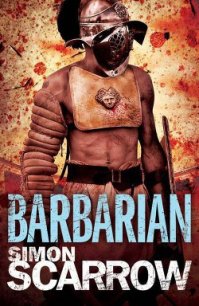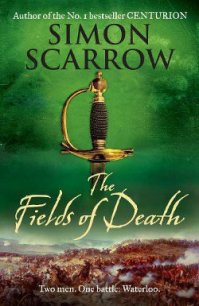Young bloods - Scarrow Simon (библиотека электронных книг txt) 📗
Napoleon crossed the room. Then, conscious of the director's gaze upon him, he extended his arm and shook his father's hand, with a polite bow. 'Father. It's good to see you again.'
'Yes.' Carlos frowned, as he contemplated the changes that the years had wrought upon his son. The boy had gone, and in his place was a pale teenager. He already knew from the letters he and Letizia had received that Napoleon was highly intelligent and had developed a breadth of mind that already exceeded his own. Carlos turned to the director.
'Might we be given a moment alone, sir?'
'Of course.' The director gestured towards the window. 'You might wish to have a stroll in the orchard. It's quite beautiful at this time of year.'
Carlos shook his head. 'I'm afraid that I no longer have the strength for such excursions. I don't want to impose on you, but could we remain here?'
The director stared at him for an instant before he nodded. 'Of course, Monsieur Buona Parte. Please be my guest. Although I have some work I need to complete by suppertime. I'm sure you understand.'
Carlos bowed gratefully. 'You're too kind, sir. I'm sure we won't keep you from your work for long.'
'Then I won't disturb you a moment longer,' the director replied.
The door closed and Carlos turned towards his son with a smile, and held out his arms. 'Show an old man, who has travelled a long way, some affection.'
Napoleon laughed and rushed forward into his father's embrace, pressing his cheek into his father's chest. Carlos laughed out loud, and then stopped suddenly, his face twisted with pain.
'What's the matter?' Napoleon asked in alarm. 'Father?'
Carlos held up a hand. 'It's all right. It will pass.'
He sat down in the chair and closed his eyes, breathing calmly as he kept hold of one of his son's hands. Napoleon glanced at the hand and noted the waxy pallor of the skin and the way it hung on the bones like old cheesecloth. Through the skin and wasted muscle he felt a tremor and for the first time sensed the terror of death. His father, whom Napoleon had taken for granted all his life, was perilously mortal. It had never really crossed his mind that his father would die. Death had simply been a fact, at several removes from experience. Until now. The fragile creature that looked up to him still held the essence of Carlos Buona Parte, but now his body was a brittle cage, no longer the solid monument to good and hearty living that it had once been. Napoleon felt sick and afraid.
'You're dying…'
'No. Not yet,' Carlos smiled. 'I'm ill, Napoleon.Very ill. That's why I've come to France for treatment.' He patted his son's hand. 'And to see you, of course. I'm hoping I can be treated and made well again. After all, I'm not yet forty – still young enough to box your ears when I get better!'
Napoleon smiled. 'I'd even look forward to that.'
'Of course, I couldn't do as good a job as your mother.'
'How is she?'
'She's well. The rest of the family is well. But she misses you most of all.'
Napoleon swallowed. 'I'll come back and see her, as soon as I can.'
'Good boy. Now then, I need to talk to you. Sit down.'
Napoleon pulled up a chair and sat close to Carlos, trying not to show the grief he felt for his father's condition. 'What do we need to talk about, Father?'
'It's Joseph.'
'What about him?'
'He says he wants to be a soldier.' Carlos looked into his son's eyes. 'Tell me, do you think he should become a soldier?'
'No,' Napoleon replied at once. 'He hasn't the temperament for it. Father, I love him – he's my big brother – but he's just too gentle, too thoughtful for such a career. I thought he wanted to join the Church.'
'He did. Now I think all the letters you wrote to him have changed his mind.' Carlos smiled. 'He wants to be like you.'
'Like me?' Napoleon was astonished. He had put up with so much hostility from most of the other cadets at Brienne over the years that the thought that anyone should want to be like him was a surprise. He was flattered by the idea that Joseph wanted to emulate him. But his brother would be a disaster as an army officer, Napoleon realised in a cold flash of reason. Joseph must be dissuaded.
'Napoleon, you may not be aware of this, but he has looked up to you from the time you could walk. He adores you, and he has the rare quality of never having resented you for being better than him. We must be careful how we speak to Joseph. I will visit him again in Autun before I go to Montpellier. I ask you to write to him. Persuade him to stay there and study for the Church. Failing that, he can always study law. He could make a success of that, I'm sure of it.'
'Yes, Father.'
Carlos placed a wavering hand on his son's shoulder. 'You're a good boy. But it pleases me that I can speak to you as an adult.'
'Thank you, Father.'
Carlos sagged back into his chair and sighed. 'Now, I'm tired. I need to rest before tomorrow's journey. Would you help an old man to his carriage? I have one waiting in the courtyard.'
'You're leaving?' Napoleon felt a stab of betrayal. 'So soon? I thought you might spend a few days here.'
Carlos looked down into his lap. 'I'm sorry. I can't stay. I must get treatment as soon as possible…'His eyes twinkled at his son. 'But when I have, when I've recovered, I'll come back to Brienne and take you up to Paris myself. Nothing would make me more proud than to watch you, in your fine new uniform, march in through the gates of the Royal Military School.'
'I'll look forward to it.'
'Now, help me up.'
Napoleon supported his father's arm as they walked down the corridor towards the courtyard and the boy felt how light the man had become – little more than a child, it seemed. At the carriage he helped his father up the steps. He slumped on to the seat, breathing heavily and perspiring.
'There! Thank you, son. I'll not keep you from your lessons a moment longer. Off you go.'
'In a moment.' Napoleon closed the door and fastened the catch. 'Let me wave.'
Carlos smiled. 'All right then. Driver! Move on.'
With a crack of the reins and a shout, the driver urged the horses into a walk. The carriage trundled down the side of the stables as Napoleon stood and watched.Then it turned and he saw his father at the window, waving to him. Napoleon quickly raised his arm and waved back, before the coach passed round the end of the stable building and was gone.
Chapter 27
It was late in October when Napoleon and the other four cadets from Brienne arrived at the Royal Military School of Paris. The school was situated in an elegant building off the Champ de Mars. As at Brienne, the student body was a mixture of fee-paying aristocrats and the holders of royal scholarships, living together under the same regime. Napoleon and his companions from Brienne were given a brief interview with the captain-commandant, an elegant man who had recently retired from a long career in the army. He congratulated them on winning places at the school and encouraged them to study hard, earn their commissions in the army and serve their King and country honourably. While they were at the school they would be treated as equals, whatever their origins, the captain-commandant stressed. The school was there to prepare them for life in the army. It was not some fancy gentleman's academy. They would be tested on their ability, and not their pedigree. Napoleon nodded with satisfaction at this. At last he would be able to demonstrate his innate talents and not be held back, or made to feel ashamed of his origins.
Once the interview was over the newcomers were shown to their rooms. After the Spartan furnishings of Brienne, Napoleon was surprised and delighted by the bright, neat room with a large window looking out on to the school's walled gardens. Filled with a heady mix of pride and delight, he threw himself on to the bed and rolled on to his back. He closed his eyes with a smile on his lips. It was almost too good to be true. A place in the most prestigious school in the land, with the prospect of a fine career before him. If only his family could see him now.They would be so proud of him. He would write to them as soon as possible, as soon as he had time to explore the school and, even better still, the great capital city that spread out on all sides around him. Soon, he would be an officer, giving orders and being responsible for the lives of the men under his command. A man in his own right, with his destiny in his own hands.




